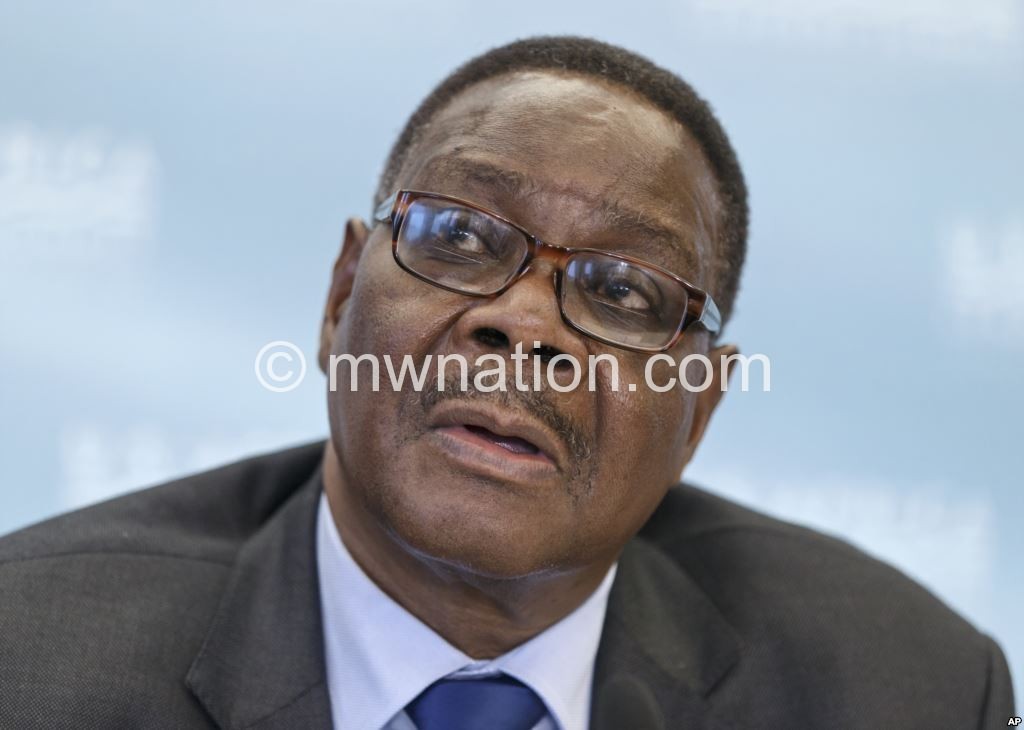DPP dominance in MEC stirs controversy
While President Peter Mutharika got a thumbs up for appointing more women and a lean Malawi Electoral Commission (MEC) team, a political analyst has observed that revelations about opposition parties having only two out of eight members threatens fairness.
Details have emerged that Mutharika’s Democratic Progressive Party (DPP) has four representatives and its partner, United Democratic Front (UDF), has two while main opposition Malawi Congress Party (MCP) and People’s Party (PP)—which have more MPs than UDF—have one representative each.
Representing DPP in the new commission are Jean Mathanga, Moffat Banda, the Reverend Clifford Baloyi and the Reverend Killion Mgawi whereas Yahaya M’madi and retained Elvey Mtafu represent UDF. Former Reserve Bank of Malawi deputy governor Mary Nkosi has gone on MCP ticket with Linda Kunje in for PP.

In a written response to The Nation’s inquiry on the political composition on Tuesday, Michael Jana, political analyst from University of Malawi (Unima) constituent college, Chancellor College, said if indeed the party distribution in the newly appointed commission is as outlined, then natural rules of fairness have been flouted.
He observed that fairness of electoral results starts with the composition of the commission and if this is flouted, that is a recipe for unfair electoral results.
Said Jana: “You will recall that the commissioners were at one point divided along political lines during the 2014 elections. Such divisions can be aggravated by biased and skewed constitution of the commission. The spirit of fairness is actually embedded in the electoral laws when it provided that the President should appoint commissioners in consultation with leaders of political parties in Parliament.”
He said as it is an open secret that DPP is in de facto coalition with UDF, it means that the governing party has six representatives.
In a telephone interview Tuesday, Malawi Electoral Support Network (Mesn) board chairperson Steve Duwa, while saying that the network has not yet looked at the numbers in relation to political representation, said much as the composition of MEC commissioners is regulated by law, the key lies in consultation.
He said Mesn’s take is that when the President has finally made the appointment it is understood that he has consulted the political parties and they actually presented the names to him and he has appointed the commissioners based on the names given to him.
Duwa said having one party dominating is an anomaly. He said the problem is compounded by the silence of the law on how political parties represented in Parliament should be represented.
The law mandates the President to appoint not less than six commissioners.
Commenting on the issue, PP spokesperson Ken Msonda said as much as his party commends the President for finally appointing the new MEC team with a gender balance and lean, the former governing party is concerned with the composition of the appointed commissioners.
He said: “We shall look at the composition and come up with our official statement on the appointment. The law requires that major political parties represented in Parliament should submit four names from which the Head of State can appoint two, but that has not been considered. It is a worrisome anomaly.”
In the previous MEC, PP had two commissioners—the Reverend Emmanuel Chimkwita Phiri and Gloria Chingota, he said.
On his part, UDF secretary general Kandi Padambo, without saying how many names his party submitted, said UDF participated in the process and two of its representatives—Mtafu and M’madi—have made it.
Efforts to speak with DPP and MCP proved futile as their representatives were either unavailable or could not be drawn to comment on the issue.
DPP secretary general Eclain Kudontoni said he needed more time to find out how many names his party submitted and how many are in the new commission.
MCP secretary general Gustave Kaliwo’s mobile phone went unanswered and was yet to respond to text messages sent alerting him about the subject as at 8pm. Publicity secretary Jessie Kabwila said she had just arrived from abroad and was not abreast with developments.
She referred the matter to deputy spokespersons Ezekiel Ching’oma and Kondwani Kaunda who, however, did not pick their phones after several calls.
The Electoral Commission Act empowers the President, subject to the Constitution and in consultation with the leaders of the political parties represented in the National Assembly, to appoint suitably qualified persons to be members of the commission on such terms and conditions as the Public Appointments Committee of Parliament shall determine. n





